Hi everyone!
Today I would like to tell you about the basic principles of Internet operation. The Internet is a global computer network, which brings together billions of devices from all over the world and allows these devices to exchange information. So, as you are reading this text, you are connected to the Internet through a computer, mobile phone or another device.
But how this text came to your screen? What happens when you type a website address or click on a link in the text? Today we will learn the answers to these questions.

Any access to the Internet (when we are looking for some information, open websites, and so on.) – it is a chain of consecutive actions that occur in the network. And every such process requires mandatory components.
We would discuss them.
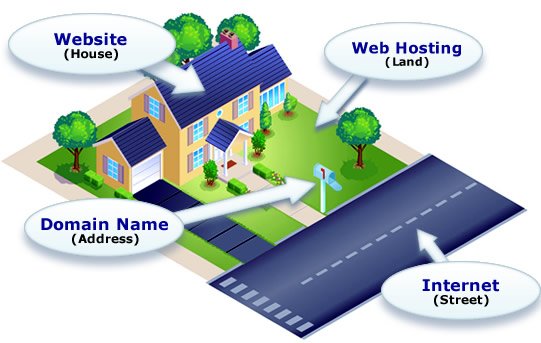
First of all - we have a User - it is YOU
Or any automated program sends a request to the Internet for getting information.
YOU need to have a computer
Or any other means of egress to the Internet, for example, your phone, tablet. Without such devices can’t reach the network.
A router must be also installed in your house
It provides the transferring of information through the network channel. We can say that the router is the cousin of GPS-navigator. Knowing the location of the two points (in the case of the internet it is the user's computer and the site on the Internet), the router paves the desired path between them to ensure the exchange of information.
Data is transmitted from one router to another until the final point - the server.
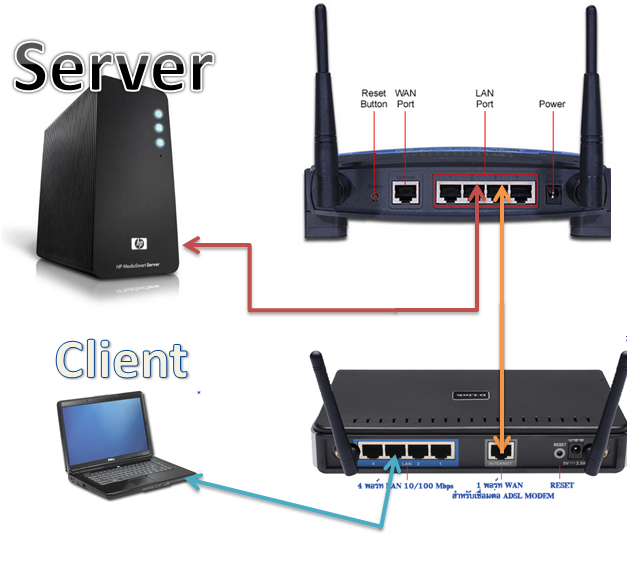
Internet service provider gives you an access to the Internet
Each city, each country has its own providers. In this case, all the providers of the world are divided into 3 categories.
First are the owners of any part of the global Internet that have their fiber-optic networks, through which they transmit traffic (a predetermined amount of information that can be obtained via the Internet) to network providers of the lowest group.
Second are the companies of a national or regional level (made by several neighboring countries).
Third are the other smaller firms-providers in the cities and regions.
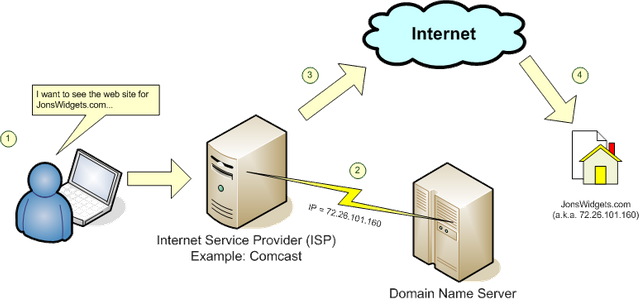
Now you can open the Internet with the help of your Browser
It is a client program for the Internet, which can be installed either from a disk or downloaded online. The most popular browsers are Google Chrome, Internet Explorer, Mozilla Firefox, Safari, and Opera.
Each program has its own characteristics, advantages, and disadvantages.
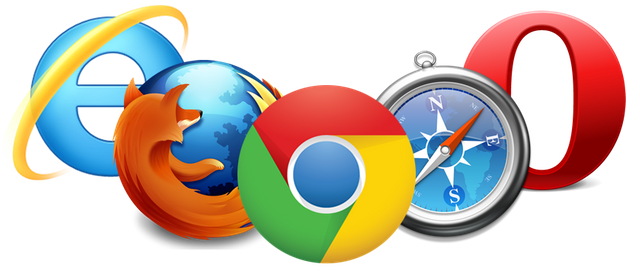
Now you can type any Domain in the address bar
The system makes the corresponding request to the ISP network. The provider has got a DNS server (Domain Name System), which allows re-encoding the domain name of the site to IP-address. IP-address (Internet Protocol Address) - a unique address of an area on the Internet, represented in the form of numbers. By the way, not only sites have got IP-address but also the computers. Each PC gets an IP-address from the Internet provider that gives an access to the network. This is done in order to be able to deliver traffic to the right address - to each particular PC and to solve any problems in service.
After this IP-address of the site is re-encoded from the decimal system of calculation to binary (with 0 and 1). The provider sends a request for getting information from the desired site to the user’s router.
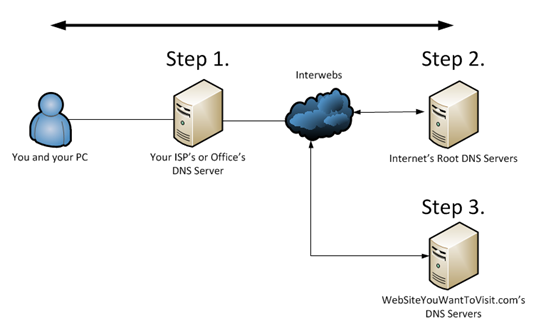
Your request will be transferred to the Server
A powerful computer that can perform the following tasks:
- Deliver traffic to a network of computers.
- Decodes domain names to IP-address.
- Keeps data. For example, it may be a server with data of users of
some e-mail: incoming and outgoing letters, letters in the spam
folder, the information from address books and so on. - Places information about the various sites and all data about them in
it's memory. Such server is called hosting.
A request for the opening of the website will be transmitted through routers to the appropriate hosting, storing information about the desired web page. A server respond will be transmitted through the reverse chain (via routers, ISP, and browser) to PC.
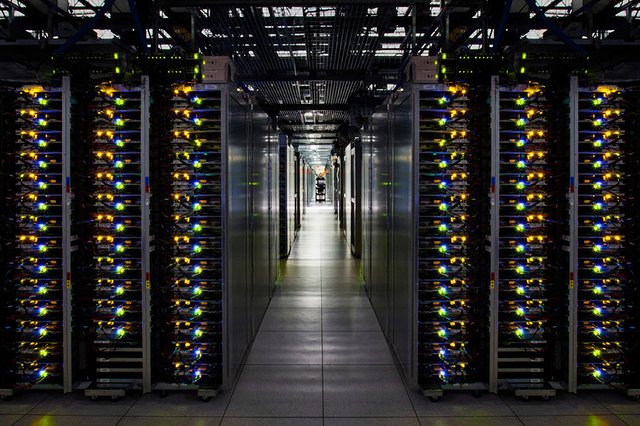
And at last port will be used to transmit information to your browser and displaying it on your screen.
It is a system resource that is allocated for application to communicate with other applications in the network. So different data that goes to a certain IP-address is then divided into different ports. So, there is a port for sending e-mails, and separately - for its receiving
There is also a separate port for working with Web sites. It analyzes the data and sends it to the browser. And so the desired page is shown to us.
In fact, all described processes take no more than a couple of seconds. You can appreciate it by trying to open any website. The page will appear in front of you in just a moment when you enter its domain name into the address bar.
Please also take a look at this amazing video to fully understand the process of the Internet work.
So now you know how the Internet works and understand that it is a really big network that consists of dozens technical components that operate harmoniously.
As you can see, when we look at the Web through a browser we usually use the domain name to enter the Web site. Does this mean that the Internet and the Web are the same things? The answer to this question is not so simple. As we know, the Internet is the technical foundation that allows billions of computers communicate with each other. Among them, there is a small group of computers (called web servers) that can send messages that are recognized by browsers. The Internet is the infrastructure, and the Web service is built on the basis of this infrastructure.
Follow Me to learn more about popular science and scientific topics.
With Love,
Kate
awesome, another points of learnings I've got, after reading this post. Thank you.
Downvoting a post can decrease pending rewards and make it less visible. Common reasons:
Submit
thanks for your feedback and follow me to learn more
Downvoting a post can decrease pending rewards and make it less visible. Common reasons:
Submit
Good post.
Today all became more complex.
Computers and servers became virtual: virtualization, cloud services...
So today the connection between internet services (dns, web, torrents) and hardware is not clear.
A lot of people use internet without router (it is for geeks), they use mobile internet.
It is funny, but they don't need browser!
Most internet users use smartphone for internet, and use applications for facebook, for news, for messangers... They don't think about web, they don't need it. I know such people.
World changes so fast...
Downvoting a post can decrease pending rewards and make it less visible. Common reasons:
Submit
Wow i learned a lot! Thanks!
Downvoting a post can decrease pending rewards and make it less visible. Common reasons:
Submit
thanks for your reply. Stay tuned
Downvoting a post can decrease pending rewards and make it less visible. Common reasons:
Submit
Sometimes I found myself having to explain this to a client. Maybe I'll just email a link to your post.
Thanks!
Downvoting a post can decrease pending rewards and make it less visible. Common reasons:
Submit
The problem is that everyone uses internet but just minority of them understands how it works. Feel free to share link if someone still has confusion about how it operates
Downvoting a post can decrease pending rewards and make it less visible. Common reasons:
Submit
WOW!, It's so much more than that little phone chord!
Downvoting a post can decrease pending rewards and make it less visible. Common reasons:
Submit
Thanks a lot for this nice post :)
I am sometimes browsing with links. That is useful when you only have at your disposal a basic terminal to play with.
Downvoting a post can decrease pending rewards and make it less visible. Common reasons:
Submit